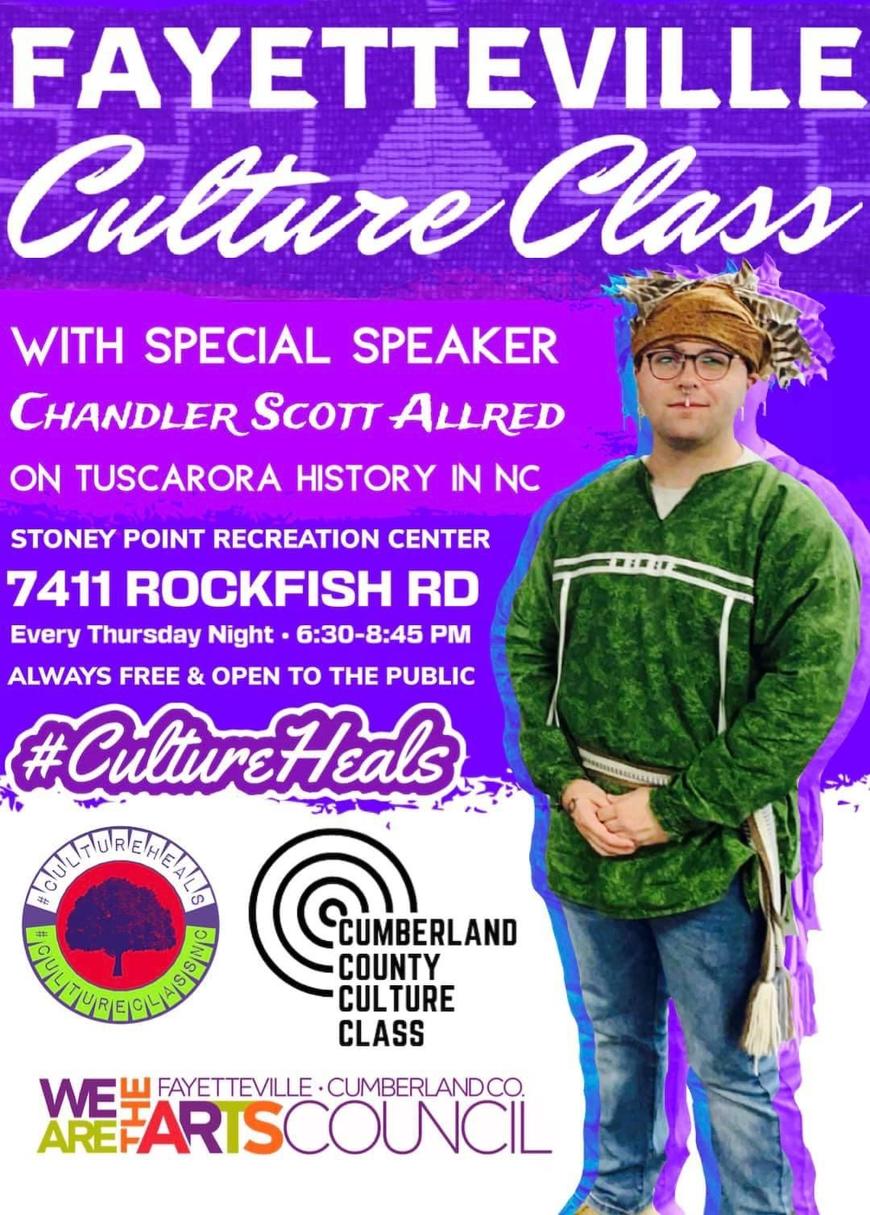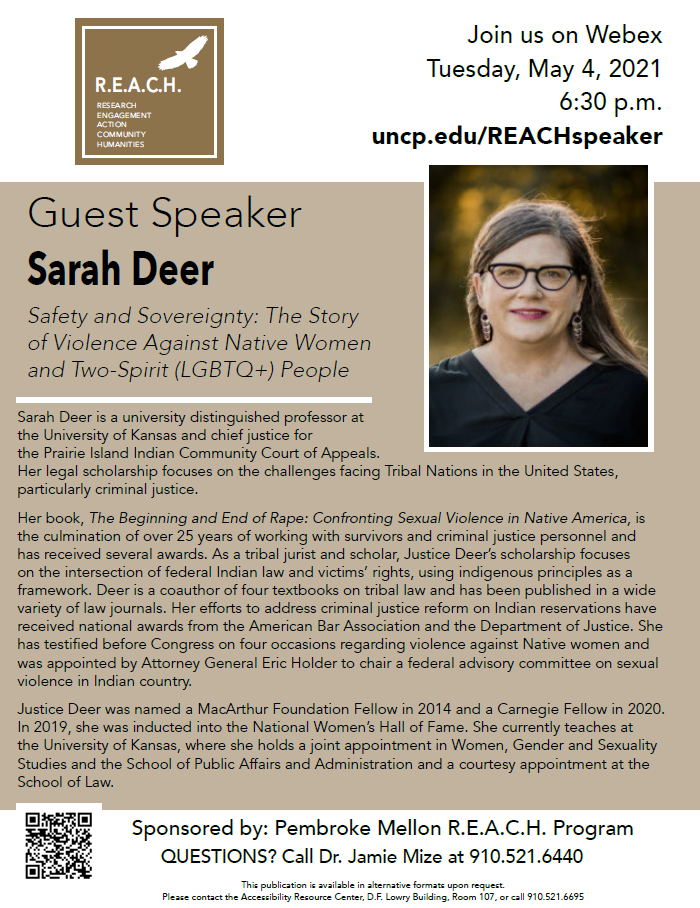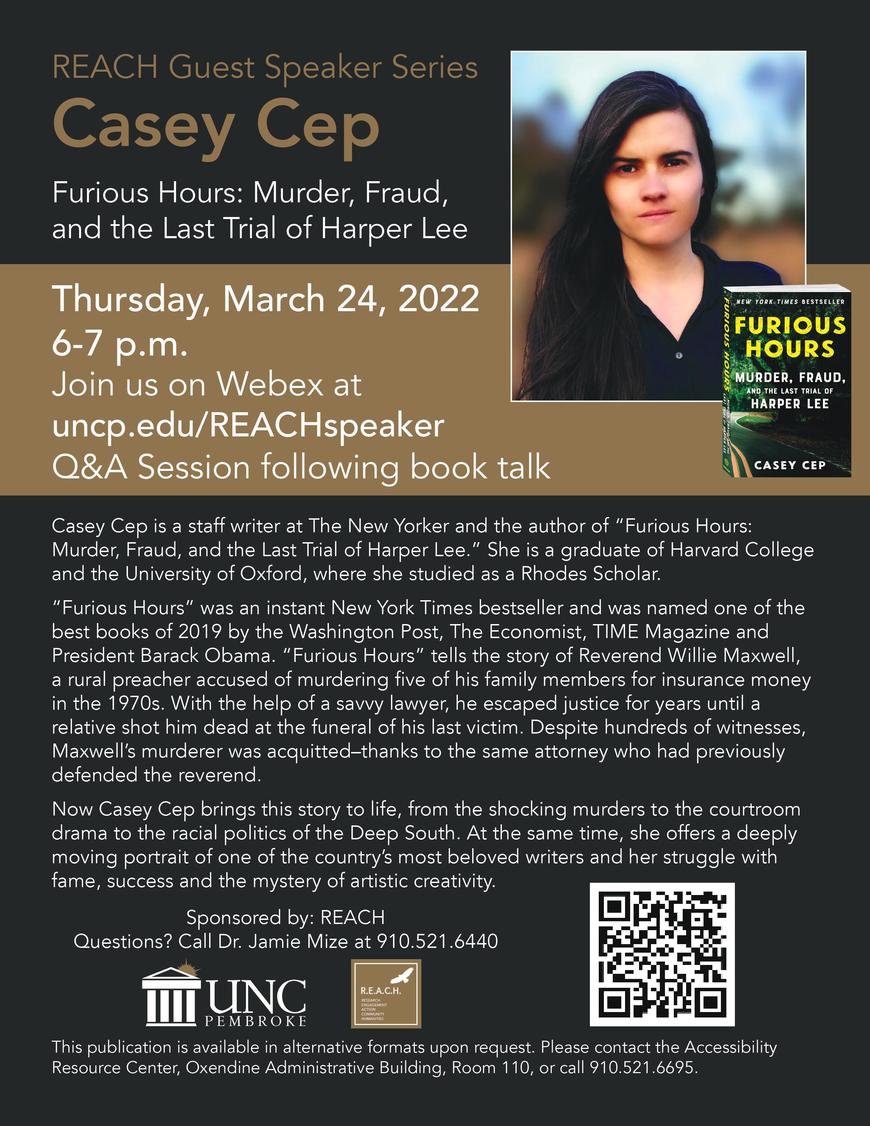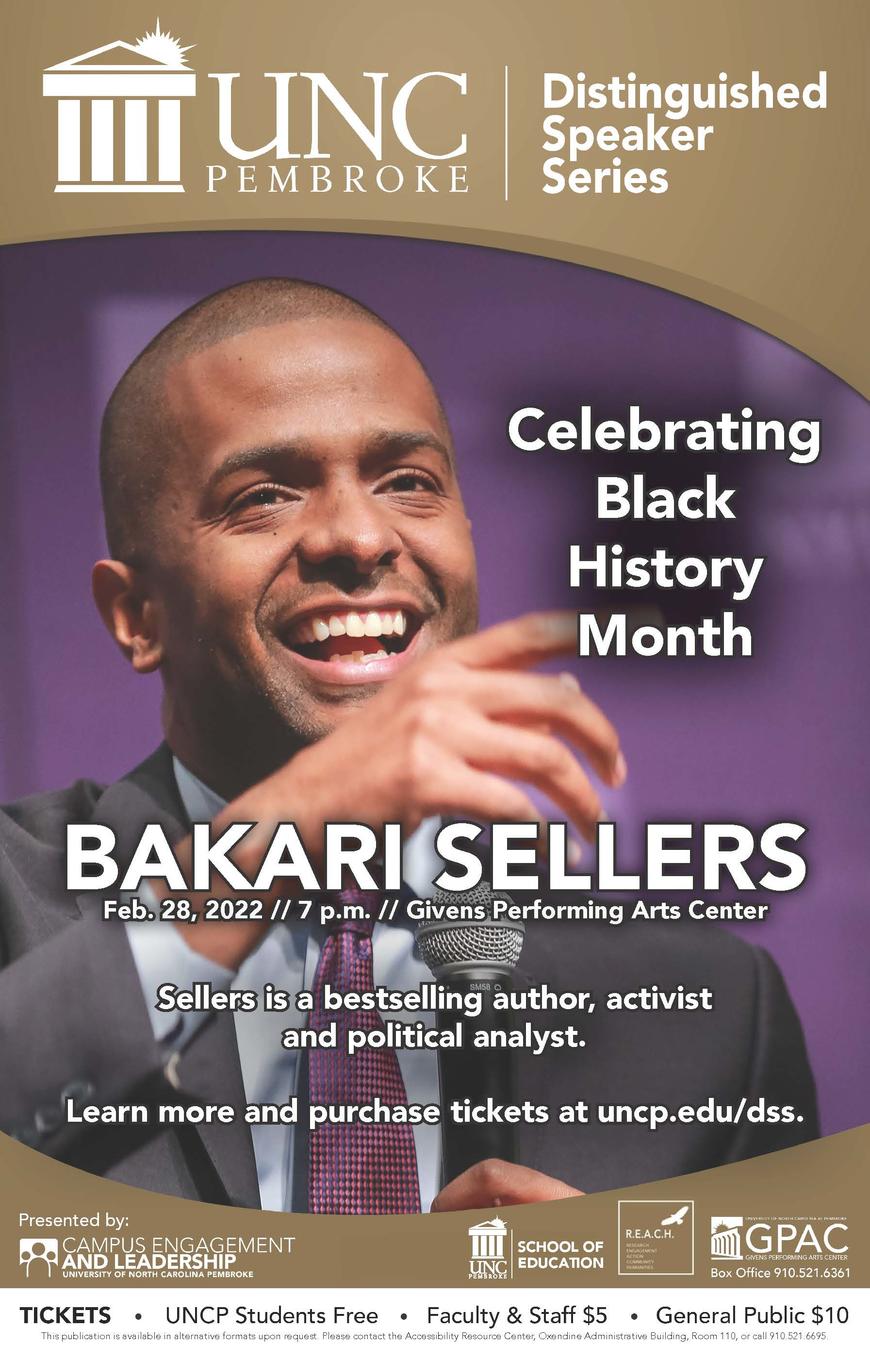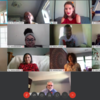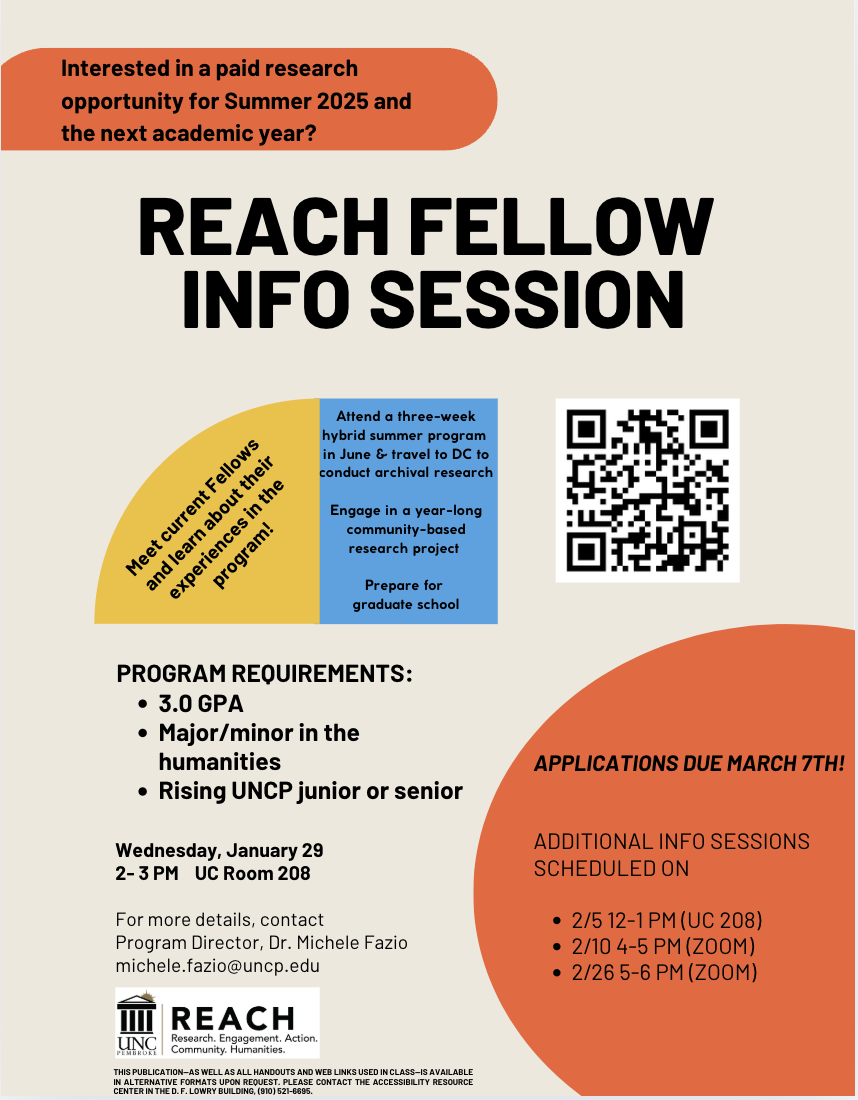
UNCP awarded $950,000 Mellon Foundation grant to support undergraduate research

Jessica Muñiz never imagined her future would include doctoral-level research at one of the nation’s leading research institutions.
A 2022 UNC Pembroke graduate and third-year PhD student at Duke University, Muñiz has found herself doing just that as she studies the buried legacies of Puerto Rican workers recruited to work on war-related projects during World War I. She credits her experience with UNCP’s REACH program with providing the confidence and skills necessary to become such a successful scholar.
“The REACH program allowed me to develop my current research, which I will eventually build into my dissertation,” Muñiz said. “It was my first experience with archival research and my first academic mentor experience, which is the structure built into grad school.
“I honestly don’t think I would’ve gotten into the doctoral program at Duke if not for the research experience I received through REACH,” Muñiz said.
Impactful research through REACH will continue at UNCP thanks to a $950,000 grant awarded by the Mellon Foundation, which has funded the program since 2019. The funds will be spread over three years.
“UNCP is honored to receive a generous grant once again from the Mellon Foundation, enabling us to continue our REACH program,” said Chancellor Robin Gary Cummings. “With our student body, UNCP is uniquely positioned to engage underrepresented groups in meaningful research, inspiring them to pursue graduate and doctoral programs. The ability to participate in undergraduate research because of this funding provides an invaluable opportunity for personal and academic growth, and each year, I’m eager to see the impressive work our students produce,” Cummings said.
REACH stands for Research Engagement Action Community Humanities. Funding supports research site visits across the United States, offsets the cost of applying to graduate school, and sends fellows to conferences to present their research.
Of the 34 REACH graduates, 70 percent have secured spots in graduate programs studying disciplines such as history, ethnomusicology, sociology and media arts production at UNCP, UNC Greensboro, East Carolina University, Duke, the Institute of World Politics, the University of Arizona, the University of Buffalo and law schools at the University of Virginia and Michigan State University.
“The work being done at UNCP through the Mellon grant exemplifies the best of what higher education has to offer and provides further proof that you don’t have to attend an R1 institution to gain the skills needed to conduct powerful research,” said Dr. Diane Prusank, provost and vice chancellor for Academic Affairs.
“In higher education, we know that being part of a research team increases the probability that a student will stay in school and complete their college degree,” Prusank continued. “In addition to increasing student success, when UNCP students engage in primary research through the REACH program, they elevate a plethora of critical skills from listening to data analysis to theory application and will take these skills into the workforce. Perhaps the most important thing is that student work will have a lasting impact on our community, which is essential to the mission of UNCP.”
This fall, the fifth cohort of 15 REACH Fellows will participate in an experiential, community-based research project documenting the life histories of the Lumbee Tribe, examining the significance of place and cultural identity as represented in the Federal Writers’ Project (FWP) and photography issued by the Farm Security Administration (FSA) from 1936 to 1940.
REACH Fellows will contribute to three public humanities projects:
-
a community-driven archive that will be shared by the Lumbee Tribe and UNCP
-
a digital story map outlining pertinent information about tribal history as it intersects with the FWP and
-
an interactive FSA photograph community exhibit illustrating race and ethnicity in North Carolina.
Dr. Michele Fazio, a professor of English and director of REACH, said the research highlights bridging academic skills with community engagement.
“As the nation’s largest supporter of the humanities, the Mellon Foundation aims to support student research and engagement. Their investment in our students eliminates the financial burden often accompanying research,” Fazio said.
“The REACH program connects local and regional history with national archives and enables our students to consider how the documentation of lived experience in the past continues to shape the present.”
This summer, a dozen REACH Fellows spent a week in Washington, D.C., exploring the Library of Congress archives located at the Jefferson and Madison Memorial buildings, visiting the Museum of the American Indian, the National Museum of African American History and Culture, and receiving a private tour of the U.S. Capitol.
Fazio and Dr. Ashley Batts Allen, associate dean of Faculty and Research, accompanied the Fellows on the trip. Allen will continue to serve as principal investigator for the Mellon grant.
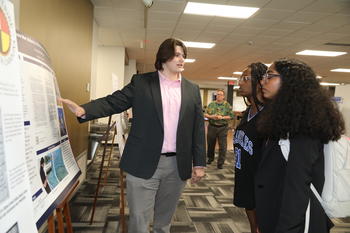
Mason Schwenneker discusses his Pearl Harbor research during the annual REACH Symposium
What began as undergraduate research into the memory aspect of war through examining personal letters of eyewitness accounts of the attack on Pearl Harbor evolved into a life-changing experience for UNC Pembroke junior Mason Schwenneker.
After months of research––and at the urging of his faculty mentor Dr. Scott Hicks––Schwenneker flew to the island of Oahu, Hawaii and toured the Pearl Harbor National Museum––the site of one of the great defining moments in history. There, he gained a deeper perspective of the surprise attack that drove the United States into World War II.
“That was one of the best experiences I’ve ever had,” Schwenneker said of his trip over spring break. “I love reading about World War II and Pearl Harbor, so it was interesting visiting this place that I’ve read about my whole life––standing above the sunken USS Arizona and watching the oil leak out––it was moving. I felt empowered.
“I also gained a new cultural perspective during my visit. We were in McDonald’s and a Hawaiian guy walks up and after I tell him about my research, he says, ‘don’t forget about the Native Hawaiians who were attacked that day,’” Schwenneker said.
Schwenneker’s trip was made possible, in part, by funding from the Mellon Foundation-funded REACH program at UNCP. He was among 18 student scholars who detailed their research at the recent REACH Symposium at the Livermore Library. After partnering with faculty mentors, fellows examined topics ranging from the emotional and psychological well-being of Indigenous youth to the sexualization and gender role ideologies men’s and women’s magazine covers.
For Junior Teresa Fernandez––whose mother and grandmother emigrated to the United States from Paraguay––her research was personal. She examined the effects of federal anti-immigrant bills on first- and second-generation Latinos in the United States and how acculturation can influence their health.
“My research is based on my lived experience,” said Fernandez, a first-generation student recently elected SGA vice president. “I’ve looked at the quality of life of Latino immigrants, especially those who don’t live in a community with Latinos, and their poor health outcomes and how this can be remedied.”
Through REACH, Fernandez was given the opportunity to present findings at the First Gen Summit at Babson College in Massachusetts last fall.
Alongside his mentor, Dr. Laura Hakala, senior Brennan Walker took an inside look into the American Tract Society–an evangelical organization in 1825–which published Christian literature. His research examines three books published to educate formerly enslaved persons.
“We noticed the agenda they were pushing was Christianity and middle-class values,” Walker said. “My argument is that the organization reinforced harmful ideologies perpetuated during slavery. The literature was destroying the African American voice.”
The year-long research was a personal reflection for Walker, too.
“For me, it was a great way to learn more about African American history and a chance to see what obstacles my people had to overcome to get to where we are today.”
Like Schwenneker, Walker said his REACH project evoked a sense of empowerment.
“It’s amazing coming from high school where I didn’t believe I was smart enough to do this kind of research,” said Walker, who is also studying history . “It’s so powerful to see me actually able to do research that is impactful and meaningful and can educate others.”

REACH Fellows gain exposure presenting at national conferences
December 7, 2023 / News
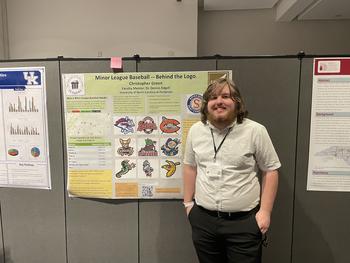
Senior Christopher Green was among the presenters at the Southeastern Division of the Association of American Geographers meeting in Norfolk, Va.
Christopher Green’s passion for history and sports inspired the UNC Pembroke senior to dive deeply into minor league baseball logos.
Green recently shared his months-long research with more than 240 scholars, professionals and students who gathered for the Southeastern Division of the Association of American Geographers (SEDAAG) meeting in Norfolk, Va.
“Being able to present my research on the national level has been an amazing experience,” Green said. “This opportunity will hopefully provide me more opportunities in the future, whether in the workforce or more academic settings such as grad school.”
Green is one of eight REACH Fellows afforded national exposure and networking at conferences throughout the fall semester. Established in 2019, the REACH (Research Engagement Action Community Humanities) program supports students from underrepresented backgrounds who are interested in pursuing a career in academia. The program––funded by the Mellon Foundation––covers travel and graduate school entrance exams. Students are assigned a faculty mentor to assist them in developing their projects.
Kayla Wingfield benefited immensely by presenting her project on labor exploitation of American and migrant children at the State of North Carolina Undergraduate Research and Creativity (SNURCS) Symposium at Wingate University.
“I enjoyed my experience overall,” Wingfield said. “The conference allowed me to present my work and see what other students were doing. I met others who were also interested in child labor and its complexities. I had amazing conversations with students and attendees who gave me meaningful advice, new resources and encouragement.”
Other REACH Fellows who presented multi-dimensional research at conferences were:
- Elizabeth Chavis also attended the SNURCS conference, presenting her research on the perceptions of risk factors for child maltreatment and social service utilization in Robeson County.
- Kiki Cohen, Jenna Humble and mentor Dr. Matthew Schneider, assistant professor in the Department of Sociology and Criminal Justice, offered presentations at the Mid-South Sociological Association in New Orleans.
- Teresa Fernandez led a 45-minute workshop at the 11th annual First Gen Summit at Babson College.
- Ahelayus Oxouzidis, Unmai Arokiasamy and REACH program director Dr. Michele Fazio presented their work on creating a new Indigenous archive at the Oral History Association annual meeting in Baltimore.
- Fazio also presented at the National Humanities Conference in Indianapolis, Indiana.
- Additionally, Fazio was invited to participate in “Rewriting America: Reconsidering the Federal Writers' Project 80 Years,” a symposium held at the American Folklife Center at the Library of Congress in Washington, DC that brought together leading scholars in the fields of history, folklore, cultural studies and media. She presented “Teaching the Federal Writers' Project: A Study of Class, Labor, and Region” and discussed the development of a new public humanities project in the REACH program
ETWL Student Kayla Wingfield Discusses Her REACH Project
October 27, 2023 / English, Theatre, and World Languages
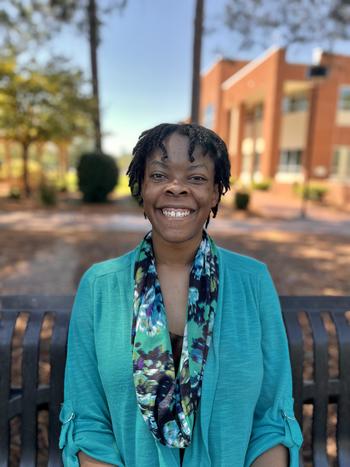
Kayla Wingfield is one of three English, Theatre, and World Languages students who is a fellow in the 2023-2024 cohort of REACH. Established in 2019, thanks to a $950,000 grant from the Andrew W. Mellon Foundation, REACH—“Research. Engagement. Action. Community. Humanities”—is an opportunity for qualified students who have a sincere interest in pursuing graduate work and a career in academia. In partnership with a faculty mentor, each fellow takes part in a summer research exploration program on campus, develops a research project, and receives funding for research, travel, graduate school entrance exams, and an application to a graduate degree program in the humanities. Members of the ETWL Publicity Committee asked Wingfield, whose mentor is associate Professor Peter Grimes, to share how her REACH research is inspiring her, her aspirations for her project, and why she values the humanities.
Q: How does your research in REACH inspire you as a student and as an English major in particular?
A: As a student working toward an English major (with a creative writing minor), my research in REACH inspires me to get better at writing and analyzing, an essential skill for students in general. A big part of my research involves taking a broad number of several types of resources, including memoirs, and taking what I learn, picking it apart, and seeing what concepts from the resource could be put into my story, whether it be for my characters, setting, or themes. My research has deepened my appreciation for literature and writing in this way. In a broader sense, my experience with REACH has inspired me to take small steps toward academic goals as a student. I'm eager to continue conducting research, pushing the boundaries of my knowledge, and contributing to the conversations involving child labor.
Q: What are your aspirations for your project, and how will it prepare you for life after college?
A: I hope my project ends up being something that opens people’s eyes to the experience of children in exploitative labor. I want to invite people to think about the many reasons that could lead a child to go into labor in the first place. While we can simply say that child labor needs to be stopped, we can’t ignore the fact that some children (who aren’t forced) voluntarily work in these dangerous occupations to provide for themselves or their families. I also hope my project reflects accuracy when it comes to the experiences of children, whether they be pre-Labor Act or migrant children. This includes cultures. For one of my characters, I’m planning to write from an Indigenous boy’s perspective. As a Black person, I need to be aware that I’m an outsider when writing from this perspective. I can’t ignore my character’s life before he moved from Guatemala—I can’t ignore his identity. A lot of consulting and research is needed in my story if I hope to have a project that is both accurate and respectful. Even after college, I think the project will help me to create future writing projects that could help talk about different issues in the world. Even going through the research phase (like consulting with professors and anthropologists) will help me to work with people after college because, as someone who is shy when collaborating with people, doing my project has been getting me out of my shell.
Q: Why is humanities research important for you personally?
A: For me, humanities research is important because it allows me to step into the shoes of people from different periods and people from different cultures. In general, I view humanities research as a way for the public and the researchers themselves to learn about topics and groups of people not really talked about a lot. I love the aspect of bringing awareness of certain issues which I can see not only with my own project but with my other REACH peers. The REACH program and humanities research in general also allowed me to get out of my comfort zone when it came to academic research and collaborating with different people. Things like this were something I avoided, things like conferences, public speaking, and meetings, out of anxiety. Taking part in this research though has made a small dent in my little bubble.
UNCP spotlights Brenda Chavez Soriano in honor of Hispanic Heritage Month
October 2, 2023 / News
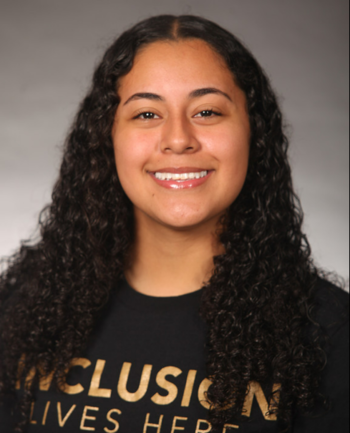
Brenda Chavez Soriano
In honor of Hispanic Heritage Month, UNC Pembroke proudly recognizes junior history major Brenda Chavez Soriano.
Soriano, a Maynor Honors College student, stands out in the classroom and the campus community, assisting with coordinating Hispanic heritage events, among other duties as chair of the Hispanic and Caribbean American Heritage Committee. She is president of the Latin Student Union, a REACH Mellon Fellow, a peer academic leader and a women’s club soccer team member.
A first-generation student from a small town in southern Chatham County, Soriano’s parents immigrated from Mexico to the United States before she was born.
"I am proud of my heritage due to the loving culture and values I hold close to my heart,” Soriano said. “Love and acceptance are core values that shape who I am. As a Hispanic student at UNCP, I have found a safe space to express and embrace my Mexican American roots.”
Growing up in her hometown, Soriano found it difficult, at times, to express herself. However, at UNCP, she feels a sense of belonging and has begun helping other Hispanic and Latinè students who may have similar experiences.
“I am grateful to be where I am today and hope I can help future generations find themselves while keeping close to their Hispanic heritage.”
Upon graduation, Soriano plans to return home and work for a nonprofit that advises Hispanic and Latinx youth to enter higher education.
“My goal is to serve as a guide and support for my community. I want to be a voice for the Hispanic and Latinx communities, motivating the youth to become the best versions of themselves.”
REACH Fellows at UNC Pembroke outline research proposals
July 13, 2023 / News
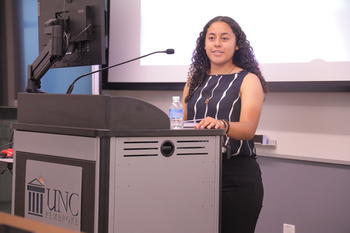
Brenda Chavez Soriano was among the REACH fellows who recently gave a presentation outlining their research for the 2023-2024 academic year
UNC Pembroke undergraduates Ahelayus Oxouzidis and Unmai Arokiasamy have been interviewing Lumbee elders this summer as part of a community-driven oral history project they will develop this academic year.
Oxouzidis and Arokiasamy will be compiling and archiving an oral history of the Lumbee Tribe as part of a comprehensive research project. The pair are among 18 REACH fellows paired with faculty mentors to shape their individual research projects.
“One of our goals is to correct and redo work from the Farm Security Administration, whose purpose decades ago was to give a face and a voice to people from underrepresented communities,” Oxouzidis said. “However, their images and notes about the Pembroke community and surrounding areas caused misrepresentation. We want to build relationships with our narrators (Lumbee Tribe) to ensure the creation of an ethical Indigenous archive.”
REACH fellows recently met to outline their research proposals with topics that range from Pearl Harbor, labor exploitation of U.S. and migrant children, retracing Chicana history in the South, and whether climate change affects family planning.
The presentations were the culmination of a four-week Summer Research Exploration program. They attended lectures by visiting scholars and UNCP faculty, visited the South Carolina Department of Archives and History, reviewed interviews collected as part of the Federal Writers’ Project, contributed to a new database cataloging the representation of race and ethnicity in the Project’s life histories, and transcribed an interview they conducted with a Lumbee elder for a new archive.
De'Maurion Shelley will examine historical perceptions of gender among American Indian communities.
“This is a great opportunity,” said Shelley, a second-year fellow. “It has helped me grow as an individual and a professional. REACH has taught me how to do research outside the classroom.”
Senior Angelina Henhawk will analyze the determinants of social and emotional well-being among American Indian youth. After graduation, she plans to return home to Buffalo and become a youth director.
“This research will give me experience working with Indigenous youth, especially in an area like Pembroke,” Henhawk said. “I’ll have the opportunity to create my programs with the kids here and develop programs I can incorporate in the future.”
Funded by the Mellon Foundation, REACH aims to increase the number of future scholars among American Indian, African American, Hispanic American and other underrepresented minorities interested in advanced study in the humanities. The program provides funds for research, travel and graduate school entrance exams.
Dr. Michele Fazio, who serves as program director, said she looks forward to tracking students' progress and offering them guidance in the coming year.
“I’m excited about all their work, especially the oral history project with the Lumbee Tribe,” Fazio said. “We are creating a community-driven archive that centers on lived experience, and the tribe will maintain who has access to it.”
“Reciprocity comes to mind when I think about this project. Students are working to preserve Lumbee culture and history while developing multiple research skills and a deeper appreciation for the humanities,” Fazio said.
The 2023-2024 fellows are De’Maurion Shelley, Unmai Arokiasamy, Mason Schwenneker, Angelina Henhawk, Jenna Humble, Kiki Cohen, Aaliyah Valdez, Brennan Walker, Ahelayus Oxouzidis, Genesis Gregory, Teresa Fernandez, Heather Lowry, Brenda Chavez Soriano, Diana Evans, Tiffany Smaw, Kayla Wingfield, Christopher Green and Elizabeth Chavis.
Past Events:

